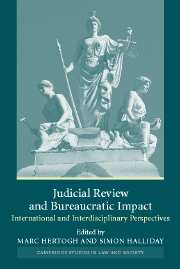Book contents
- Frontmatter
- Contents
- Acknowledgments
- Notes on the contributors
- Introduction
- Part One Conceptual and methodological issues
- 1 Understanding judicial review and its impact
- 2 Conceptual issues in researching the impact of judicial review on government bureaucracies
- 3 Studying bureaucratic implementation of judicial policies in the United States: conceptual and methodological approaches
- Part Two International case studies
- Part Three The future of judicial review and bureaucratic impact
- Bibliography
- Index
2 - Conceptual issues in researching the impact of judicial review on government bureaucracies
from Part One - Conceptual and methodological issues
Published online by Cambridge University Press: 29 July 2009
- Frontmatter
- Contents
- Acknowledgments
- Notes on the contributors
- Introduction
- Part One Conceptual and methodological issues
- 1 Understanding judicial review and its impact
- 2 Conceptual issues in researching the impact of judicial review on government bureaucracies
- 3 Studying bureaucratic implementation of judicial policies in the United States: conceptual and methodological approaches
- Part Two International case studies
- Part Three The future of judicial review and bureaucratic impact
- Bibliography
- Index
Summary
INTRODUCTION AND BACKGROUND
Attempts to understand the impact of judicial review are undertaken for a variety of reasons, most generally because such an understanding tells us something about the ways in which courts matter. This, of course, is of interest for a multitude of reasons to those working in a broad range of contexts across a spectrum of disciplines from constitutional law, political science, and socio-legal studies to organisational and political theory. The rich variety of approaches that may be adopted when studying impact offers researchers considerable scope, but it carries dangers particularly for those attempting to make use of research that may have been undertaken within particular disciplinary frameworks or in the context of other jurisdictions. In the previous chapter, Peter Cane argued, for example, that the impact of judicial review can be effectively researched only in the light of the assumed or asserted purposes and functions of judicial review and that these are likely to vary depending on jurisdictional factors and the approach being taken.
Given the opportunities for researchers and the risks that are associated with cross-disciplinary and cross-jurisdictional research, it is important for those working in this field to be clear about the nature and purpose of their research as well as the ground to be covered. Perspectives, approaches and goals may vary widely, but clarification, particularly in relation to the basic conceptual building blocks of the work to be undertaken, should always be sought when designing research.
- Type
- Chapter
- Information
- Judicial Review and Bureaucratic ImpactInternational and Interdisciplinary Perspectives, pp. 43 - 75Publisher: Cambridge University PressPrint publication year: 2004
- 6
- Cited by

